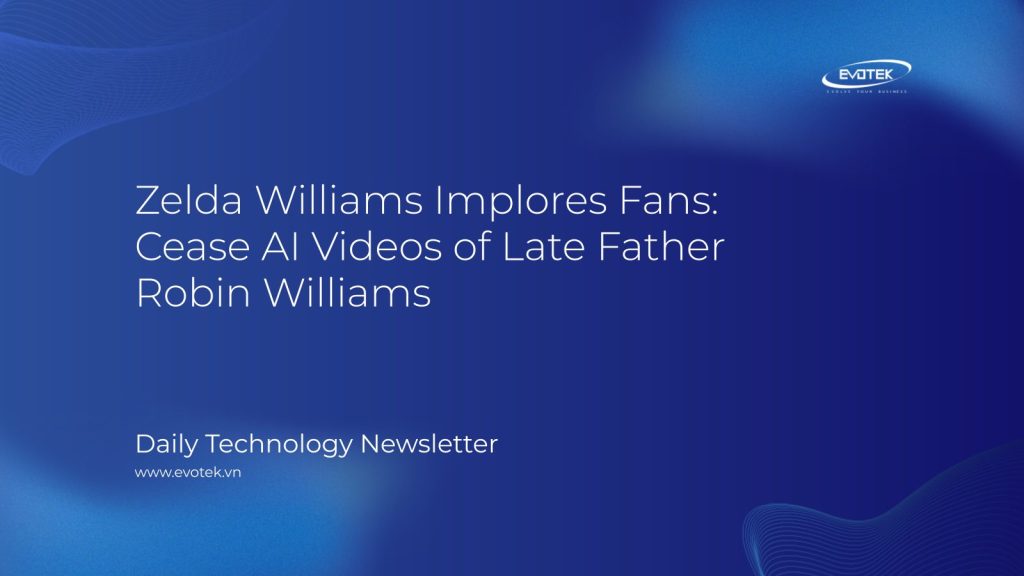Zelda Williams, daughter of the beloved late actor Robin Williams, has issued an impassioned plea to fans, urging them to stop sending her artificial intelligence (AI) generated videos featuring her father. Her request highlights a growing ethical debate surrounding AI’s use in recreating deceased celebrities’ likenesses, a practice she finds deeply disturbing and disrespectful.
Zelda Williams’ Heartfelt Appeal Against Digital Recreations
Taking to social media, the director and writer expressed her profound discomfort with the influx of AI content. “Please, just stop sending me AI videos of Dad,” Williams wrote on her Instagram Stories. She firmly stated, “Stop believing I wanna see it or that I’ll understand, I don’t and I won’t.”
Williams did not mince words when describing her view of these digital imitations. She characterized them as “disgusting, over-processed hotdogs out of the lives of human beings” and slammed the practice as “horrible TikTok slop puppeteering.” For Williams, these creations are not art but rather a crude recycling of human legacies, reducing complex individuals to mere digital approximations.
The Lingering Legacy of Robin Williams
Robin Williams, a revered figure in American entertainment known for iconic roles in films like Mrs. Doubtfire and Dead Poets Society, passed away by suicide in 2014 at the age of 63. His death followed a struggle with health issues, including a misdiagnosis of Parkinson’s disease, with an autopsy later revealing he had Lewy body dementia—an incurable brain disease affecting sleep, causing hallucinations, and impacting motor functions.
The sensitive nature of his passing, combined with his enduring cultural impact, makes the unsolicited AI recreations particularly painful for his family. Zelda emphasized, “it’s NOT what he’d want,” stressing that such content is a “waste of time and energy” for all involved.
A Broader Industry Concern: AI and Performer Rights
Zelda Williams’s strong stance isn’t new; she has been a vocal critic of AI’s burgeoning role in the entertainment industry. Her comments echo concerns that partly fueled the 2023 Hollywood actors’ strike, which addressed the unauthorized use of AI to replicate performers’ voices and appearances, especially those who can no longer consent.
She previously stated, “I’ve witnessed for YEARS how many people want to train these models to create/recreate actors who cannot consent, like Dad.” Williams warned that the ramifications extend beyond personal feelings, asserting that AI recreations are “at their very best, a poor facsimile of greater people, but at their worst, a horrendous Frankensteinian monster.”
While many share Zelda’s apprehension, some industry figures hold differing views. Matthew Lawrence, who played Robin Williams’s onscreen son in Mrs. Doubtfire, expressed interest in potentially reviving Williams’s voice using AI, “with the respect and with the OK” from his family, to “do something really special.” Williams’s extensive voice acting career, including roles like the Genie in Disney’s Aladdin, underscores the potential and pitfalls of such technology.
The issue has also impacted other celebrities, with Scarlett Johansson raising alarms about “imminent dangers of AI” after deepfake videos featuring her and other public figures circulated online. The rapid advancement of tools like OpenAI’s Sora 2 has led to a flood of AI-generated videos of deceased celebrities across social media platforms, including fabricated advertisements and interactions.
The Ethical Debate: Art vs. “Hotdogs”
Williams adamantly refuses to label AI as “the future,” instead describing it as “just badly recycling and regurgitating the past to be reconsumed.” Her powerful metaphor of “The Human Centipede of content” underscores her conviction that AI-generated creations, particularly those exploiting deceased individuals, represent a low point in artistic and ethical standards.
This ongoing debate challenges the boundaries of creativity, consent, and legacy in the digital age, prompting essential questions about how society should respect the memory and work of those who are no longer able to speak for themselves.
—
If you are experiencing feelings of distress, or are struggling to cope, you can speak to support services in confidence. In the USA, the National Suicide Prevention Lifeline is available at 1-800-273-TALK (8255). In the UK and ROI, Samaritans can be contacted on 116 123. International helplines can be found at www.befrienders.org.

 日本語
日本語 한국어
한국어 Tiếng Việt
Tiếng Việt 简体中文
简体中文